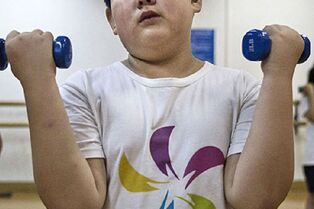肥胖在中国不再是富贵病
|
Exposing their bellies to a television audience while their weight is displayed on screen, obese contestants on a hit Chinese reality show compete to slim the fastest, with a midriff-baring weigh-in a weekly highlight. Thirty per cent of Chinese adults — roughly 320m people — are overweight and about 12 per cent obese, China’s health watchdog said last week, creating an eager audience for Jiangsu Television’s Changing My Life. As China escaped from decades of poverty, obesity was connected with higher incomes. But there is mounting evidence that, as has occurred in western countries, the link with affluence is breaking, with lower-income urban residents more prone to the problem.
Using education levels as a proxy for socioeconomic status, Chinese and Australian researchers have found that while the better-educated in China’s less-educated areas are more likely to be overweight, the reverse relationship holds in areas with a better-educated population, which tend to be urban. “Received wisdom that obesity is a ‘disease of the affluent’ in China is simply not good enough,” the researchers write in a paper to be published this month in the medical journal Health and Place. Data for the study was obtained from some 98,000 adults in 2010. Changing My Life’s 10 contestants, chosen from urban areas, are put through a military-style fitness regime while hosts scrutinise their snack-filled diets and probe their family histories for emotional traumas in an attempt to figure out the root cause of their overeating. Every week the one who has lost the least weight is eliminated in an often tearful public ordeal. The majority of the the contenders are far from wealthy. The champion of the show’s first series, broadcast last year, was low-paid prison guard Zhan Changguan, who shed 66 kilograms over the course of the series. His main rival Gao Chilin was a school dropout from the central city of Wuhan, who lost 61kg. Chinese newspapers have picked up on the changes in distribution of obesity. “The rich becoming thin while the poor become fat should not be a trend,” the state-run China Youth Daily declared in November. It called for more public sports facilities rather than the fee-paying gyms that the increasingly health-conscious urban middle classes are joining at uNPRecedented rates, while working-class urban residents say they have little time to exercise. China’s growing weight problem — the country in 2014 overtook the US to boast the world’s largest obese population, while the average waistline expanded by 2.7cm among men and 2.1cm among women in the decade up to 2012 — has fuelled an explosion in obesity-related diseases such as diabetes. The ruling Communist party vowed last year to boost the number of people “frequently participating in physical exercise”, targeting an increase to 530m by 2030 from 360m in 2014. The research suggests investments in facilities for lower-income urban residents will be crucial. |









